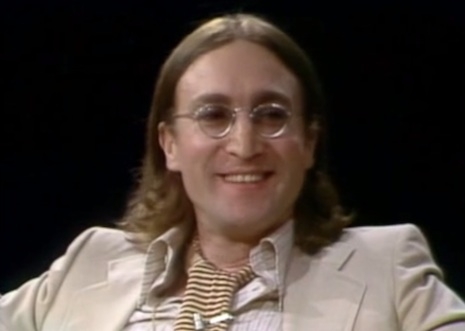
This probably qualifies as one of the least original ideas for a post I’ve ever had—a full-length nationally broadcast interview with one of the most magnetic rock stars of the twentieth century—but what the hell: this is darn good footage and it deserves to be part of the Dangerous Minds archive one way or another. It’s John Lennon’s appearance on The Tomorrow Show hosted by Tom Snyder, which, according to The John Lennon Encyclopedia by Bill Harry, was taped on April 8, 1975, and was aired on April 28, 1975. Tom Snyder is as idiosyncratic and dorky as ever, but this is an awfully good conversation, such as it is, full of the charm of Lennon engaging with an interviewer who at least isn’t dumb and is fully focused on the topic at hand—you could do a lot worse.
Snyder himself, in 1980, avers somewhat tentatively that this seems to be the last television interview Lennon ever gave. That claim, while surprising, has not been strenuously challenged, at least not in my nugatory attempts to research the issue. Lennon more or less dropped out of sight in 1975, and if he felt like not giving TV interviews to support his album Double Fantasy, which had come out in October, then so be it. It’s useful to remember that he didn’t do any live shows either—for his last concert, you have to go back even farther, to 1974. The man was semi-retired.
In 1975 one of the topics that was consuming John Lennon was his lengthy legal problems with the U.S. Immigration Service, which had gone to some lengths to block John and Yoko’s attempts to establish residency in the United States. Lennon’s attorney, Leon Wildes, appears late in the telecast and explains that the U.S government’s issues with Lennon obscurely stemmed from the days of Watergate,when Strom Thurmond passed a memo to Nixon’s Attorney General John Mitchell or some such.
(True story: My dad briefly worked as a journalist in DC in the early 1970s, and he was present at a press conference John and Yoko held about their immigration case around 1972 at the National Press Club—actually, if anyone has any documentation of that event, I’d be awfully interested to hear more about that. My dad was a jazz nut and, while glancingly impressed by the idea of seeing a Beatle give a press conference close up, he didn’t give it all that much thought.)
It’s apparent that the immigration case was a pretty big topic in the media at the time, and in fact it was settled in Lennon’s favor a few months later, in October. Of course the irony, that Lennon fought so hard to live in the city in which he would be killed at the early age of 40, is awful to contemplate.
This video is actually a rebroadcast of the interview that was aired on December 9, 1980, and I’m sure many of you out there don’t need me to tell you the significance of that date. Of course, John Lennon was shot and killed the day before, and Snyder introduces the 1975 interview and then interviews music journalist Lisa Robinson and producer Jack Douglas, who worked on Imagine and Double Fantasy (which was then quite a new album, and also the first John Lennon album in five years). The 1975 footage is of course presented in the light of this horrifying tragedy, and it’s interesting to hear Robinson’s and Douglas’s thoughts—Douglas in particular is understandably very emotional about having lost his dear friend. It strikes me that, in our current era, you would never see interviews quite like this after an event like the sudden death of a major star, today you’d have a lot of talking heads weighing in and everyone would somehow be angling for top dog on the subject, and there’d just be a lot of spin. This isn’t to say that Robinson and Douglas didn’t know they were on TV or weren’t choosing their words carefully, but it just seems a lot less mediated, they were invited to give their thoughts, and they did so in a relatively unfussy way.
As for Lennon himself, it’s wonderful to be reminded of the intelligent charm of the man—shit, I’d love to hang out with that guy for an hour or two. As much as Lennon “signified” and no matter how grandiose his political or artistic of philosophical concepts could be, at bottom he was a witty, cheerful, sassy, sarcastic Liverpudlian with a lot of sensible and sharp ideas in his head. Snyder several times mentions Lennon’s humility—that doesn’t quite seem like the right word but I understand entirely what Snyder meant by it. Lennon spent his entire adult life as the object of unremitting adulation, praise, and (if you will) love, and something in him inevitably saw the preposterousness in it—as I’m sure all the Beatles did after a few months of Beatlemania. Listen to Lennon address the idea of a John Lennon anti-drug PSA; if anyone understood the limits of celebrity advocacy, it would surely be John Lennon. He figured kids would say, “Well who the hell are you to say I shouldn’t smoke pot?” and he was surely dead right about that.
As for the rest of the interview, be sure to tune in. Snyder might get on your nerves but even Lennon says himself that he’s a fan! Lennon’s thoughts on the breakup of the Beatles, the absurdity of Beatlemania, his affection for New York, his admiration for reggae, none of it is groundbreaking or new, but it’s still well worth a look.
Previously on Dangerous Minds:
Yoko Ono’s plea for gun control expressed in one image: John Lennon’s blood-splattered glasses
John Lennon’s school detention sheets go up for sale
The Clash take on Tom Snyder, armed with a teddy bear, 1981